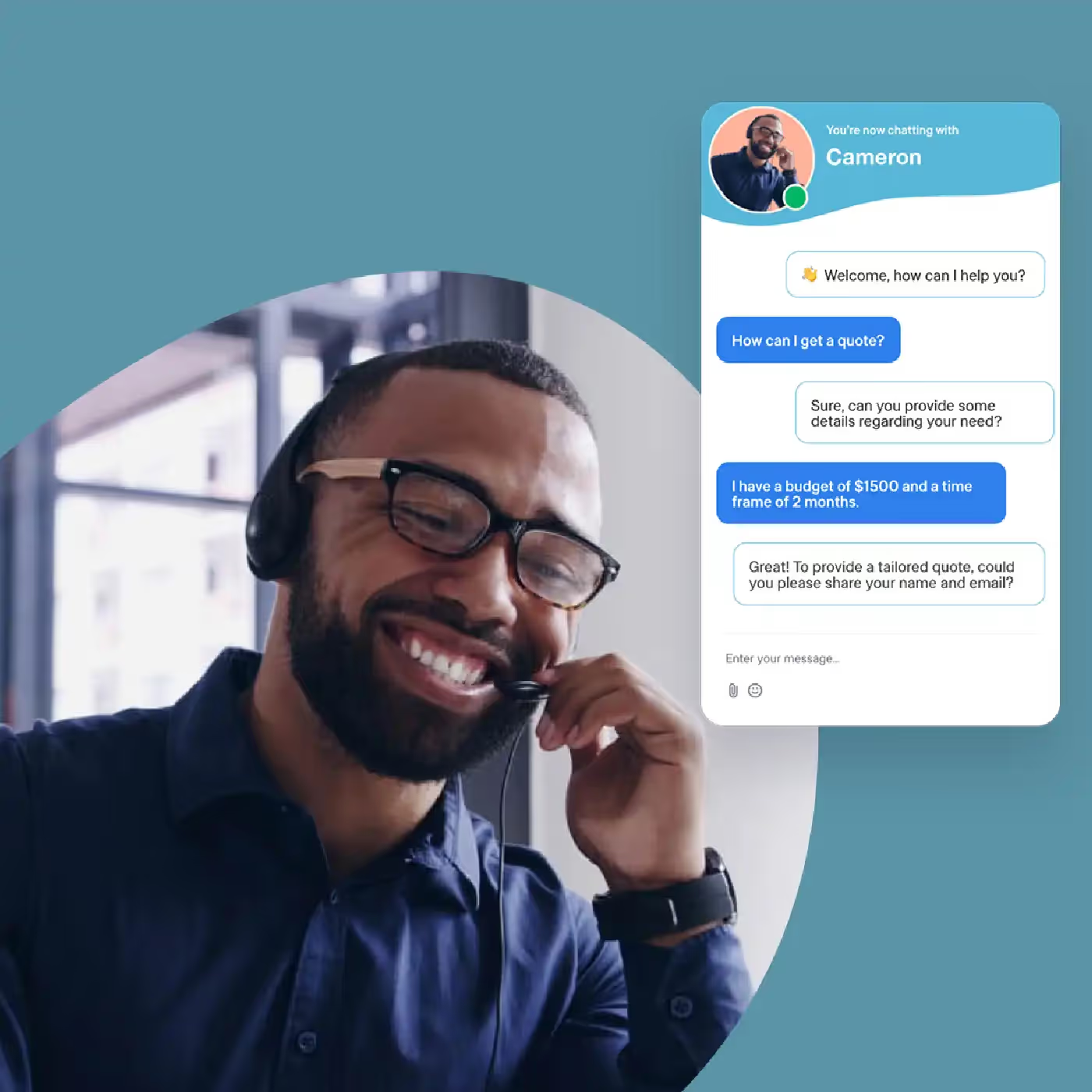Best Plumbing Software 2025 | CRM, AI Call Answering + More
Best Plumbing Software 2025 | CRM, AI Call Answering + More

You're under a sink fixing a leak, and your phone starts ringing. Do you answer it and risk looking unprofessional? Or do you let it go to voicemail and maybe lose a customer?
Most plumbing software handles the business side pretty well. But when it comes to actually talking to customers? That's where things fall apart.
You need to combine your field management tools with smart communication systems that can handle calls like a real person.
How Plumbing Apps Became Serious Business Tools
Plumbing software used to be pretty basic. You had simple scheduling apps, and that was about it. Now? These things can handle your entire business.
The good ones manage jobs, track customers, handle invoicing, and work on your phone while you're out in the field. The software market is expected to hit $7.16 billion by 2028 because it actually solves real problems.
But here's the thing. Even the best plumbing software still can't handle your phone calls properly. And that's a big problem when you're trying to run a business.
List of Best Software for Plumbers in 2025
Let's talk about what's actually out there. These are the platforms most plumbers are using:
ServiceTitan
This one's built for bigger operations. It's got everything — customer management, marketing tools, detailed reports. If you've got multiple trucks and want to run things like a real business, this is probably your best bet.
Housecall Pro
Super easy to use, which is why smaller plumbing companies love it. You can schedule jobs, send invoices, and the mobile app actually works well. It won't overwhelm you with features you don't need.
Jobber
Good middle ground between simple and complex. Scales nicely as you grow from solo to a small team. The pricing won't kill you either, which matters when you're starting out.
FieldEdge
Solid choice if you want something that handles the workflow side really well. Good job management, tracks your inventory, plays nice with QuickBooks. Does what it says it'll do.
ServiceM8
Everything's in the cloud, works great on mobile. If you spend most of your time in the field and want something that just handles the basics really well, this could work.
WorkWave
Enterprise-level stuff. Route optimization, business intelligence, the works. Only makes sense if you're running a pretty big operation across multiple areas.
SimPRO
Great for project management if you do bigger commercial jobs. The estimating tools are solid, and it tracks materials well. More complex than most need.
Here's the problem though. None of these really solve the phone issue.
The Secret Tool all Plumbers Need
Every plumbing software company will tell you their system manages everything. But they all miss the biggest issue. What happens when your phone rings?
You know this scenario. You're focused on a tricky repair, hands covered in whatever you don't want to think about, and the phone starts buzzing. 34% of customers still prefer calling over texting or emailing.
If you answer, you sound distracted and unprofessional. If you don't answer, they call the next guy on Google. Either way, you lose.
And it gets worse with emergencies. Someone's basement is flooding at 2 AM. They're not going to wait for you to check your voicemail in the morning. They need help now, and whoever answers first gets the job.
Virtual receptionists aren't new, but AI-powered ones are changing the game. Think of it like having someone who actually understands plumbing answer your phone 24/7.
What They Can Actually Do
These systems don't just take messages. They can handle real conversations about plumbing problems. They know the difference between a dripping faucet and a burst pipe. They can ask the right questions to figure out if this is a real emergency or something that can wait until morning.
They'll book appointments directly in your calendar, screen out time-wasters, and make sure you only get calls worth your time. No more "Can you just tell me how to fix this myself?" calls.
How They Connect to Your Business
The smart ones integrate with whatever software you're already using. New customer calls? The info goes straight into your system. Emergency at 3 AM? It follows your escalation rules and gets you on the phone immediately. These systems help you automate business operations, saving you time and effort.
They can verify addresses to make sure jobs are in your service area. They can collect payment info upfront. They can even handle basic scheduling questions without bothering you.
Creating a Complete Technology Stack
Building an effective technology ecosystem requires thoughtful integration of field operations software, communication solutions, and successful sales methodologies.
Utilizing seamless workflow integrations and embracing AI-driven sales processes, you can ensure your tools work together efficiently. The optimal configuration varies based on business size:
Solo Plumbers benefit from simple scheduling software with mobile capabilities, paired with an AI Receptionist who handles all calls and maintain calendar synchronization.
Small Teams (2-5 Technicians) need comprehensive field service software with scheduling, invoicing, and basic CRM, possibly integrated with AI ticketing systems and combined with AI-enhanced call handling for overflow and after-hours requests.
Growing Companies (6-15 Technicians) require advanced business management platforms with inventory tracking and reporting, supplemented by virtual receptionists for nights, weekends, and overflow periods. Effective management is crucial at this stage.
Enterprise Operations (16+ Technicians) benefit from enterprise resource planning systems with advanced analytics, paired with specialized department routing and 24/7 emergency response services. They may also implement AI-driven sales processes to enhance efficiency and revenue.
Additionally, incorporating interactive marketing tactics can further enhance customer engagement.
This strategic technology pairing allows plumbing businesses to leverage specialized tools for their intended purposes while creating a cohesive operational system.
The Money Behind Smart Communication
When customers get immediate, professional responses, they stick around and spend more, improving conversion rates. Implementing customer loyalty programs can also encourage repeat business and increase revenue. Pairing this with effective advertising strategies can further boost your revenue.
Your best plumber makes you the most money when they're actually plumbing. Every minute they spend on the phone is a minute they're not doing what they do best.
When skilled plumbers focus exclusively on technical work, their productive capacity goes way up. More billable hours per day, happier employees, and better revenue.
Your Next Move
You've got great plumbing software handling your operations. The AI Receptionist from Smith.ai solves this problem without adding overhead or complexity, allowing you to focus on expanding service offerings.
It integrates with your existing software and handles calls like someone who actually understands plumbing.
Ready to stop missing calls and start capturing more business? Book a free consultation to see how it works with your specific setup.
Frequently Asked Questions
What software would a plumber use?
Most plumbers use field service management platforms like ServiceTitan, Housecall Pro, or Jobber for scheduling, invoicing, and customer management. The missing piece? Professional phone answering that actually understands plumbing.
What is plumbing in software?
In software development, "plumbing" means the infrastructure code that connects different systems. For plumbing businesses, it means field service software that manages your operations plus communication tools that handle your calls.
What is CAD in plumbing?
CAD (Computer-Aided Design) software helps design plumbing systems for complex projects. Think AutoCAD or Revit MEP. Different from the day-to-day business management software most plumbers actually need.
Which tool is used for plumbing?
For the business side, field service management software handles jobs and customers. But the tool most plumbers miss is professional phone answering. That's where The AI Receptionist from Smith.ai comes in to capture every lead.
Take the faster path to growth. Get Smith.ai today.
Key Areas to Explore

Your submission has been received!














.svg)



